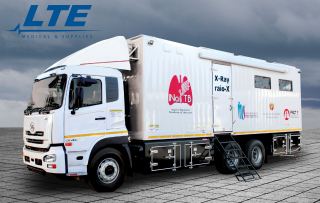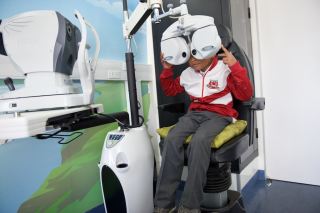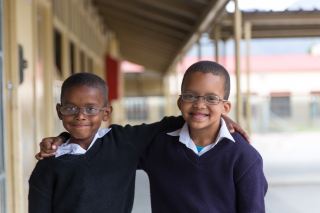LTE Mobile Clinics Providing TB Screening to Rural Communities
LTE Medical & Supplies, a South African healthcare solutions company, was contracted by The Global Fund (TGF) and the Mozambican Ministry of Health (MISAU) to design, build, equip and support three mobile Tuberculosis (TB) screening clinics consisting of X-Ray and laboratory facilities.
The clinics are built on a 6x4 truck chassis offering TB screening services in isolated and rural parts of Mozambique with capability to screen more than a 100 patients per day. The clinics are fully equipped with the latest in digital radiology equipment, point of care laboratory testing equipment and cloud reporting imaging software. With the combination of a built in hybrid PV solar & diesel generator and plug-in utility power, water tanks as well as extended fuel tanks, the clinics are fully self-sustainable and capable of extended operation in remote areas. LTE offers turnkey solutions to our clients and have become the leaders in the international mobile healthcare industry. The company boasts A list clients like The Global Fund, Samsung, Right to Care and various international Ministries of Health all over the African continent.
“LTE is honoured and we are proud to be associated with The Global Fund that contributes so much to underprivileged communities all over the world. LTE’s vision is to build a better Africa and we believe that every person should have access to healthcare. We focus on providing holistic, sustainable solutions with the necessary support to ensure optimal outcomes.” Says LTE CEO, Dr Gerhard Ferreira.
The Global Fund is a 21st century partnership organization designed to accelerate the end of AIDS, tuberculosis and malaria as epidemics.Founded in 2002, the Global Fund is a partnership between governments, civil society, the private sector and people affected by the diseases. The Global Fund raises and invests nearly US$4 billion a year to support programs run by local experts in countries and communities most in need.
MST changing Lives, one pair of glasses at a time
For most of us, being visually impaired means going to an optometrist and having the correct glasses prescribed. Unfortunately, thousands of people in South Africa, and millions globally, do not have access to these services due to a lack of funds or services in their areas. Despite the fact that the restoration of sight and blindness prevention strategies have been proved to be amongst the most cost-effective interventions in healthcare, according to the International Agency for the Prevention of Blindness.
A joint report published in June of this year by the World Economic Forum, the Schwab Foundation for Social Entrepreneurship, and EYElliance, states the world economy suffers a $227 billion shortfall every year due to lost productivity among adults who need glasses. According to the report 2.5 billion people are living with poor vision unnecessarily because they do not have corrective eyewear. Of these, 80% are living in developing countries. Providing affordable access to reading glasses alone would boost productivity by up to 34% and bring down levels of illiteracy, which costs the global economy $1.19 trillion a year.
The effects of not having access to eye care and reading glasses are equally disruptive to children and can lead to impaired academic, sport and social performance. For this reason, a visual screening is included in the Integrated School Health Policy for children of all ages attending South African schools. The government has also implemented a mobile primary healthcare service, where mobile clinics travel to rural schools to deliver these services. At the moment, the company at the forefront of this drive is Mobile Schools Health (MSH), a subsidiary of Mobile Satellite Technologies (MST), the market leader in the provision and operation of specialised mobile vehicle solutions in South Africa.
According to MST CEO, Fernando Acafrao, they create beneficial public-private partnerships between the government and sponsors such as Eskom and Nedbank. Thanks to partnerships like these, MSH is currently operating 11 mobile clinics in the Western Cape, Mpumalanga, Gauteng and KwaZulu-Natal. In the Western Cape alone, the company is screening an average of 200 children per week and in the first half of 2016 over 5% of all learners screened in this province were referred to receive glasses.
Resident MSH optometrist, Motobi Selopyane has provided 151 children with glasses in 2016. Each child receives a follow-up visit after six months and, according to Selopyane the feedback is overwhelmingly positive. “The children’s grades improve and they have the potential to a better life. A pair of glasses makes a big difference in their lives,” he says. Acafrao explains that the need for optometry services in underserved areas is extremely high but not being addressed sufficiently. “Government is currently spending thousands of rands to get one child’s eyes checked while MSH can provide optometry, dental and primary healthcare services at just over R500 per child.”
“If you go to a school in a township or a rural area you don’t see one kid with glasses, and you don’t see one teacher with glasses, it’s the blind leading the blind. No-one puts value to supplying glasses to this demographic but there is huge supporting documentation that it’s probably the single biggest thing that can increase gross domestic product,” says Acafrao. MSH’s vision is to increase their offering and, by 2018, have 100 vehicles operational in all nine provinces and treat 1 million learners per year in order to have a real and lasting impact on the future of South Africa.
MSH improves lives at Wemmershoek Primary
Mobile Schools Health (MSH), a subsidiary of Mobile Specialised Technologies (MST), had the privilege of delivering glasses to two children who were examined at our recent visit to the Vrede en Lust Wine Estate in Franschhoek for the Young Presidents’ Organisation (YPO) Gold education event. During this event, MSH worked with local children from Wemmershoek Primary School to showcase their work to members of the organisation. The glasses were delivered to Jayrin and Logan, two vibrant and friendly youngsters whose happiness and excitement were contagious.
While at the school to deliver the glasses, MSH representatives took the opportunity to talk to the school principal, Mr Christopher Boonzaaier and learnt more about the challenges that learners and community members face every day. According to Boonzaaier the closest clinic to the school is at Groendal, approximately 10km away, and a visit there can keep a child out of school for a whole day. This, combined with a range of other factors, make the MSH service incredibly valuable for schools such as Wemmershoek. The MSH focus is on preventative healthcare and provides optometry, dental and primary healthcare examinations to children at their schools. This means learners don’t have to miss a day of school for a basic check-up and their parents do not have to miss a day at work to take their children to school. “I think, for now, looking after the main things like eyes, teeth and a general examination, is valuable. If there’s anything wrong it can be found at a very early stage,” says Boonzaaier.
Handing over glasses to the children was a humbling experience. Kim Spencer, sales manager of MSH, says easily accessible quality healthcare is often taken for granted by most people but it is a very different scenario for these learners. She continues: “On a daily basis, these learners face barriers to learning, including poor health and eyesight which has a direct impact on their learning in the classroom as well as their day-to-day activities. The genuine care for the children at Wemmershoek Primary School, lead by a fantastic principal, Mr Boonzaaier, is evident. Giving Logan and Jayrin their glasses was an absolute honour for us – children like them are the very reason we created MSH.”
YPO representative, Christopher Rolfe explained that events such as the one that took place in September, when the MSH mobile travelled to Vrede en Lust, are designed to increase member learning about the world around them. “Take home value is key, and in this event, in partnership with MSH, we were able to showcase a unique, innovative business solution that is solving real world problems.” Fernando Acafrao, CEO of MST – the holding company of MSH – was also there to explain to members of the YPO how MSH is planning on solving several problems, such as the delivery of medical services to underserved communities, and how members can get involved.




